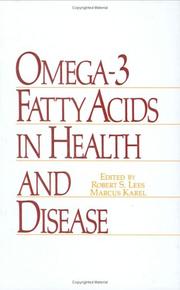| Listing 1 - 8 of 8 |
Sort by
|
Book
ISBN: 0442237480 Year: 1990 Publisher: New York (N.Y.) Van Nostrand Reinhold
Abstract | Keywords | Export | Availability | Bookmark
 Loading...
Loading...Choose an application
- Reference Manager
- EndNote
- RefWorks (Direct export to RefWorks)

ISBN: 0824782925 Year: 1990 Publisher: New York (N.Y.) : Dekker,
Abstract | Keywords | Export | Availability | Bookmark
 Loading...
Loading...Choose an application
- Reference Manager
- EndNote
- RefWorks (Direct export to RefWorks)
Book
Year: 2016 Publisher: Basel, Switzerland : MDPI - Multidisciplinary Digital Publishing Institute,
Abstract | Keywords | Export | Availability | Bookmark
 Loading...
Loading...Choose an application
- Reference Manager
- EndNote
- RefWorks (Direct export to RefWorks)
Annotation The role of major dietary omega-3 fatty acids (-3; -linolenic acid, eicosapentaenoic acid and docosahexaenoic acid) in human health has generated enormous scientific interest and many controversies in recent years. Due to a growing number of studies with conflicting or even negative clinical results, the former "hype" of -3 thought to be beneficial in many aspects of human health regardless of the physiological and clinical preconditions is now being critically re-evaluated, especially with respect to the potential role of -3 fatty acid supplementation in preventing a variety of diseases and clinical conditions. This critical view reflects the complex interaction of -3 with cell membranes and their integrated proteins mediating signal transduction, transport systems, and other processes. Moreover, -3 are precursors of bioactive metabolites, such as eicosanoids, lipoxins, resolvins, protectins, maresins, and nitrolipids that influence several physiological and pathophysiological processes and their full spectrum of effects are only beginning to be defined. Finally, physiological and pathophysiological conditions as well as concomitant pharmacological treatments may influence the specific and non-specific actions of -3 supplementation.This Special Issue of the Journal of Clinical Medicine will emphasize the role and biological interactions of -3 with regard to cancer, psychiatric disorders, metabolic disorders and nutrition and will also reflect on some basic molecular and cellular mechanisms.
Book
Year: 2016 Publisher: Basel, Switzerland : MDPI - Multidisciplinary Digital Publishing Institute,
Abstract | Keywords | Export | Availability | Bookmark
 Loading...
Loading...Choose an application
- Reference Manager
- EndNote
- RefWorks (Direct export to RefWorks)
Annotation The role of major dietary omega-3 fatty acids (-3; -linolenic acid, eicosapentaenoic acid and docosahexaenoic acid) in human health has generated enormous scientific interest and many controversies in recent years. Due to a growing number of studies with conflicting or even negative clinical results, the former "hype" of -3 thought to be beneficial in many aspects of human health regardless of the physiological and clinical preconditions is now being critically re-evaluated, especially with respect to the potential role of -3 fatty acid supplementation in preventing a variety of diseases and clinical conditions. This critical view reflects the complex interaction of -3 with cell membranes and their integrated proteins mediating signal transduction, transport systems, and other processes. Moreover, -3 are precursors of bioactive metabolites, such as eicosanoids, lipoxins, resolvins, protectins, maresins, and nitrolipids that influence several physiological and pathophysiological processes and their full spectrum of effects are only beginning to be defined. Finally, physiological and pathophysiological conditions as well as concomitant pharmacological treatments may influence the specific and non-specific actions of -3 supplementation.This Special Issue of the Journal of Clinical Medicine will emphasize the role and biological interactions of -3 with regard to cancer, psychiatric disorders, metabolic disorders and nutrition and will also reflect on some basic molecular and cellular mechanisms.

ISBN: 0895297213 9780895297211 Year: 1996 Publisher: Garden city park (N.Y.): Avery,
Abstract | Keywords | Export | Availability | Bookmark
 Loading...
Loading...Choose an application
- Reference Manager
- EndNote
- RefWorks (Direct export to RefWorks)
Omega-3 fatty acids --- Omega-3 fatty acids --- Fish oils in human nutrition.
Book
ISBN: 1634850475 9781634850476 9781634850247 1634850246 Year: 2016 Publisher: New York
Abstract | Keywords | Export | Availability | Bookmark
 Loading...
Loading...Choose an application
- Reference Manager
- EndNote
- RefWorks (Direct export to RefWorks)
Fish oils in human nutrition. --- Fish oils --- Fish liver oils --- Fish-oil --- Fishery products --- Marine animal oils --- Nutrition --- Health aspects.
Book
ISBN: 1489983937 1441905421 9786612331121 1282331124 144190543X Year: 2009 Publisher: London : Springer,
Abstract | Keywords | Export | Availability | Bookmark
 Loading...
Loading...Choose an application
- Reference Manager
- EndNote
- RefWorks (Direct export to RefWorks)
It is becoming increasingly evident that the deficiency of n-3 fatty acids in diet is not only associated with cardiovascular diseases, but also involved in stroke, epilepsy and other neurological and neurodegenerative diseases, such as Alzheimer disease, Parkinson disease, and peroxisomal diseases. In his newest book, Beneficial Effects of Fish Oil on Human Brain, Dr. Akhlaq A. Farooqui expands on the status and therapeutic importance of n-3 fatty acids (major components of fish oil) and their mediators in normal brain and those with neurodegenerative and neuropsychiatric diseases. Farooqui presents the benefits of n-3 fatty acids on Western diet, which is enriched in n-6 fatty acids (major components of vegetable oil) and may promote the above neurological disorders. The book will present readers with cutting edge and comprehensive information on metabolism and roles of neural membrane n-3 fatty acids. Neuroscientists, clinicians, neurologists, neuropathologists, opthamologists, dietitians, and nutritionists will find this book useful for understanding the molecular basis of n-3 fatty acids and their lipid mediators (resolvins and neuroprotectins) in neuroprotection in acute neural trauma (stroke, spinal cord trauma and head injury) and neurodegenerative diseases. About the Author: Dr. Akhlaq A. Farooqui is a leader in the field of brain phospholipases A2, bioactive ether lipid metabolism, polyunsaturated fatty acid metabolism, glycerophospholipid-, sphingolipid-, and cholesterol-derived lipid mediators, and glutamate-induced neurotoxicity. He has discovered the stimulation of plasmalogen-selective phospholipase A2 (PlsEtn-PLA2) and diacyl- and monoacylglycerol lipases in brains from patients with Alzheimer disease. Stimulation of PlsEtn-PLA2 produces plasmalogen deficiency and increases levels of eicosanoids that may be related to the loss of synapses in brains of patients with Alzheimer disease. Dr. Farooqui has published cutting edge research on the generation and identification of glycerophospholipid-, sphingolipid-, and cholesterol-derived lipid mediators in kainic acid neurotoxicity by lipidomics. He has previously authored four monographs: Glycerophospholipids in Brain: Phospholipase A2 in Neurological Disorders (2007); Neurochemical Aspects of Excitotoxicity (2008); Metabolism and Functions of Bioactive Ether Lipids in Brain (2008); and Hot Topics in Neural Membrane Lipidology (2009). All monographs are published by Springer.
Brain --Diseases --Nutritional aspects. --- Fish oils --Health aspects. --- Fish oils in human nutrition. --- Fish oils --Physiological effect. --- Omega-3 fatty acids --Health aspects. --- Fish oils in human nutrition --- Fish oils --- Omega-3 fatty acids --- Brain --- Central Nervous System --- Fatty Acids, Unsaturated --- Dietary Fats, Unsaturated --- Oils --- Nervous System --- Dietary Fats --- Fatty Acids --- Lipids --- Fats --- Anatomy --- Chemicals and Drugs --- Fish Oils --- Fatty Acids, Omega-3 --- Human Anatomy & Physiology --- Health & Biological Sciences --- Animal Biochemistry --- Neuroscience --- Health aspects --- Nutritional aspects --- Diseases --- Physiological effect --- Nutritional aspects. --- Health aspects. --- Physiological effect. --- N-3 fatty acids --- Omega-3 EFA --- Omega-3 essential fatty acids --- Fish liver oils --- Fish-oil --- Cerebrum --- Mind --- Medicine. --- Neurosciences. --- Neurochemistry. --- Clinical nutrition. --- Neurology. --- Biomedicine. --- Clinical Nutrition. --- Unsaturated fatty acids --- High-omega-3 fatty acid diet --- Fishery products --- Marine animal oils --- Nutrition --- Central nervous system --- Head --- Personal health and hygiene. --- Medicine --- Nervous system --- Neuropsychiatry --- Neural sciences --- Neurological sciences --- Medical sciences --- Biochemistry --- Neurosciences --- Neurology . --- Clinical nutrition --- Diet --- Diet and disease --- Dietotherapy --- Food --- Medical nutrition therapy --- MNT (Medical nutrition therapy) --- Nutrition therapy --- Dietetics --- Therapeutics, Physiological --- Therapeutic use
Book
ISBN: 9780128028452 0128028459 0128028440 9780128028445 Year: 2016 Publisher: Amsterdam : Academic Press,
Abstract | Keywords | Export | Availability | Bookmark
 Loading...
Loading...Choose an application
- Reference Manager
- EndNote
- RefWorks (Direct export to RefWorks)
Fish oils in human nutrition. --- Fish oils --- Seafood --- Fish Oils --- Seafood. --- Nutritional Physiological Phenomena. --- Health aspects. --- therapeutic use. --- Nutrition --- Nutrition Phenomena --- Nutrition Physiological Concepts --- Nutrition Physiological Phenomenon --- Nutrition Process --- Nutritional Phenomena --- Nutritional Physiological Phenomenon --- Nutritional Physiology --- Nutritional Physiology Concepts --- Nutritional Physiology Phenomenon --- Nutritional Process --- Nutritional Processes --- Nutrition Physiological Phenomena --- Nutrition Physiology --- Nutrition Processes --- Nutritional Physiology Phenomena --- Concept, Nutrition Physiological --- Concept, Nutritional Physiology --- Concepts, Nutrition Physiological --- Concepts, Nutritional Physiology --- Nutrition Physiological Concept --- Nutritional Physiology Concept --- Phenomena, Nutrition --- Phenomena, Nutrition Physiological --- Phenomena, Nutritional --- Phenomena, Nutritional Physiological --- Phenomena, Nutritional Physiology --- Phenomenon, Nutrition Physiological --- Phenomenon, Nutritional Physiological --- Phenomenon, Nutritional Physiology --- Physiological Concept, Nutrition --- Physiological Concepts, Nutrition --- Physiological Phenomena, Nutrition --- Physiological Phenomena, Nutritional --- Physiological Phenomenon, Nutrition --- Physiological Phenomenon, Nutritional --- Physiology Concept, Nutritional --- Physiology Concepts, Nutritional --- Physiology Phenomena, Nutritional --- Physiology Phenomenon, Nutritional --- Physiology, Nutrition --- Physiology, Nutritional --- Process, Nutrition --- Process, Nutritional --- Processes, Nutrition --- Processes, Nutritional --- Food --- Nutritional Sciences --- Phototrophic Processes --- Autotrophic Processes --- Heterotrophic Processes --- Chemoautotrophic Growth --- Sea-Food --- Sea Food --- Sea-Foods --- Seafoods --- Sea food --- Fishery products --- Food of animal origin --- Fish liver oils --- Fish-oil --- Marine animal oils --- Fish oils.
| Listing 1 - 8 of 8 |
Sort by
|

 Search
Search Feedback
Feedback About UniCat
About UniCat  Help
Help News
News